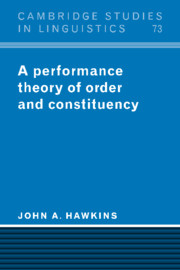Book contents
- Frontmatter
- Contents
- Preface
- Acknowledgments
- List of abbreviations
- 1 Introduction
- 2 The grammaticalization of processing principles
- 3 Early immediate constituents
- 4 Testing EIC's performance predictions
- 5 Testing EIC's grammatical predictions
- 6 Grammaticalized node construction
- 7 Conclusions
- Envoi
- Notes
- References
- Index of names
- Index of languages
- Subject index
2 - The grammaticalization of processing principles
Published online by Cambridge University Press: 18 September 2009
- Frontmatter
- Contents
- Preface
- Acknowledgments
- List of abbreviations
- 1 Introduction
- 2 The grammaticalization of processing principles
- 3 Early immediate constituents
- 4 Testing EIC's performance predictions
- 5 Testing EIC's grammatical predictions
- 6 Grammaticalized node construction
- 7 Conclusions
- Envoi
- Notes
- References
- Index of names
- Index of languages
- Subject index
Summary
In this chapter I shall ask how a grammar could, in principle, respond to processing. Grammars have their own basic format of grammatical categories and principles, as defined within a given theory or model. So when we talk about a grammar responding to a principle of performance, or “grammaticalizing” that principle, we have to view this interaction either within the context of some given format, or (as we shall do here) within the context of general properties of many such formats, if one wishes to remain more theory-neutral. The ultimate explanation for a format or formats presumably reduces to some interaction of the innateness, cognitive-semantic and other explanatory primitives underlying universals that were summarized in ch. 1.5. Performance principles contribute to this format and to the associated grammatical principles, but they do so relative to restrictions that are imposed by the other primitives, and they will, in turn, impose restrictions of their own on other explanatory forces. As a result, the precise manner in which a given performance principle can be expressed in a grammar is complex, and the translation from performance to grammar may not always be one-to-one. I begin this chapter by outlining some general ways in which grammars appear to have responded to processing. This enumeration is not intended to be exhaustive. Rather, it serves merely as a background to the major types of grammatical responses for which I shall argue in this book.
- Type
- Chapter
- Information
- A Performance Theory of Order and Constituency , pp. 19 - 56Publisher: Cambridge University PressPrint publication year: 1995



